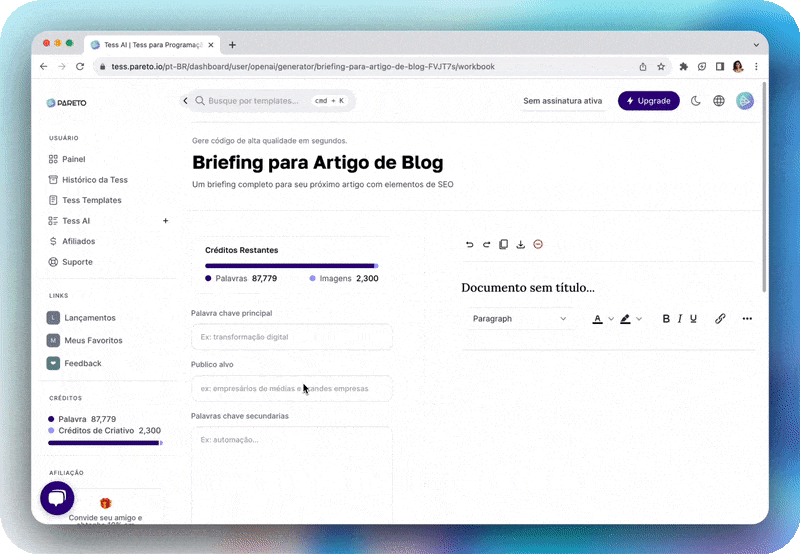Artificial intelligence in digital marketing has become a strategic ally in digital marketing, increasing the personalization and efficiency of campaigns and generating significant results for businesses.
Imagine a fashion company using artificial intelligence to analyze data from a customer's past purchases and online behavior, allowing it to offer highly relevant recommendations, such as clothing suggestions based on individual style and preferences.
The result? More targeted, engaging and effective campaigns. Read on to discover how AI is transforming marketing and improving the customer experience.
1. Chatbots
Chatbots are one of the most obvious applications of artificial intelligence in digital marketing. These automated virtual assistants interact with customers in real time, offering quick and personalized responses, making the experience more efficient.
With the use of machine learning, the AI behind chatbots is continually improving. The more they interact with users, the smarter and more effective they become, providing an ever better experience.
2. Paid Media
With Tess AI, improving and boosting your paid media strategy is a simple task. The platform offers a variety of pre-configured templates that serve as a starting point for creating highly personalized ads.
It suggests audiences for paid media campaigns for various channels, such as Google Ads. And the process is intuitive and straightforward: just choose the template that aligns with your objectives, provide essential information and that's it!
Check out some of the templates on offer:
- Script for Video Ads on Youtube Ads;
- Branding planning;
- Text Ads for Products and Services;
- Keywords for Brand Campaigns, among others.
3. Recommendations system
O smart recommendation system uses advanced algorithms to analyze user behavior data and offer personalized recommendations for products, services or content.
In e-commerce, for example, AI is used to analyze customers' purchasing, browsing and interaction histories. Based on this data, recommendation systems can offer complementary or related products to what the customer has already bought or shown an interest in.
4. Text generation with AI
With advanced natural language processing algorithms, AI is able to automatically generate different types of content to make your tasks easier.
On the Tess AI platform, you can find a diverse collection of text templates, each designed specifically to meet your particular needs. Check out some of them:
- Titles for blog articles;
- Sales e-mail;
- Description of product functions;
- Script for a video ad;
- Complete live streaming script;
- Description for Instagram post;
- Turning text into a post for LinkedIn, etc.
Below is a preview of how Tess AI can help you generate content quickly and efficiently, in this case referring to the creation of an inspiring blog briefing.
5. Image creation

AI offers a significant benefit when it comes to creating visual content for marketing campaigns. It can automatically generate personalized images, saving not only time but also resources that would otherwise be needed for manual production.
Tess AI, the Artificial Intelligence platform, is a great example for various automation applications, including image creation, as it increases the efficiency of visual content production and allows companies to provide a continuous flow of high-quality material for their marketing strategies.
6. Text to Audio Transcription
Text-to-speech technology uses AI to generate incredibly realistic and natural synthetic voices.
It is indispensable for professionals in content production, digital marketing, dubbing and other areas that require audio creation. Perfect for promotional videos, social media, audiobooks, podcasts, virtual assistants and chatbots.
Here's an example of converting text into speech with the ElevenLabs tool in Tess AI.
7. Programmatic Media Buying
Marketing teams face the challenge of choosing the best places to display ads. Even with plans based on user preferences, the flexibility and agility to adjust campaigns in real time are not always there.
This is where AI excels in programmatic media. Programmatic media platforms use machine learning to automatically bid on relevant spaces, based on data such as the target audience's interests, location and purchase history.
8. Target audience segmentation
AI uses data such as browsing history, purchasing behavior and interests to identify specific segments with similar characteristics.
For example, a fashion brand can target customers by style, displaying ads aligned with individual preferences. In addition, AI continuously adjusts segmentation as behavioral patterns evolve.
9. Social Media Monitoring
AI automatically analyzes large volumes of data from social networks, identifying trends, sentiments and consumer behavior in real time.
It also classifies and categorizes mentions, highlighting the most relevant topics for the brand. This allows companies to adjust their strategies based on concrete data and prioritize areas of greatest impact.
10. Competitor Insights
AI tools analyze public information available online, such as websites, social networks and news, to extract relevant data about competitors' activities and strategies.
This includes evaluating campaign performance, identifying product trends, monitoring prices and analyzing audience reactions. In addition, AI can help identify opportunities for differentiation, highlighting gaps in competitors' strategies that the company can take advantage of to stand out.
11. Generating Leads
Measuring the Marketing team's contribution to increasing company revenue is becoming increasingly precise and fast. Knowing what generates more Marketing Qualified Leads (MQLs) and Sales Qualified Leads (SQL) is one of the many benefits that Machine Learning brings.
With it, AI helps to qualify customer lists and prospects very precisely, using relevant data available online. With each sale made, the data is updated, improving the forecast of possible new sales.
Overall, it can be seen that Generative AI brings several benefits, such as cost reduction and operational efficiency, improved customer experience, data-driven decision-making and scalability and competitiveness.
In Which Marketing Strategies to Use Artificial Intelligence?
Find out which strategies to bet on AI to boost your business!
Market Research
AI transforms market research by analyzing reviews, blogs and social networks to identify consumer trends and preferences.
For example, a cosmetics company can use AI to detect new demands and adjust its product lines and marketing strategies according to customer perceptions, keeping up to date with market trends.
Nutrition flows
Product Development
Loyalty
By incorporating AI into the quest for loyalty, companies can cultivate a more solid and lasting relationship with their customers, fostering repeat positive interactions and boosting loyalty over time.
This high engagement results in a loyal customer base, who not only continue to do business, but also become enthusiastic brand advocates. Among other strategies!
How to Choose the Best AI Platform for Marketing?
With the growing variety of solutions in marketing automation, choosing the right AI platform can be challenging. Evaluate the following essential criteria to make the right choice:
- Feature set: most automation platforms have a similar set of tools, so make sure they have the features you're really looking for;
- Ease of use: look for a solution that has an intuitive interface, makes it easy to carry out tasks and requires minimal learning and training;
- Integrations: consider which integrations are critical for your teams and choose a solution that has the best integration with this software;
- Support: make sure you select a supplier that stands behind its product and treats all customers with the same level of service and support.
That's why we invite you to get to know Tess AI, the Pareto AI that meets all these criteria and can transform your marketing approach.

A Tess AI is the first Artificial Intelligence orchestrator, developed by Pareto using a secure and robust system.
It uses the most popular AI models on the market such as GPT-4, Dall-E 3, Stable Diffusion 3, Claude 3.5, Gemini ,Llama 3.1, Google Imagen 3, among others, to create text, images, code and much more in a matter of seconds, in one place.
There are more than 200 specialized modules ready to quickly perform routine tasks in various areas, such as marketing. Try Tess AI for 7 days with a satisfaction guarantee or get your money back!
Conclusion
Artificial Intelligence in digital marketing is transforming the way companies understand, interact with and serve their customers.
With the ability to analyze large volumes of data in real time, identify complex patterns and predict trends, AI offers a solid basis for strategic decisions and highly personalized campaigns.
There's no denying the impact of technology, but here's a provocation: was this article generated by AI? The answer may surprise you, reinforcing the growing influence of AI in marketing.
The future of interaction between humans and technology promises exciting challenges and discoveries! Find out now how it can efficiently solve your problems.






